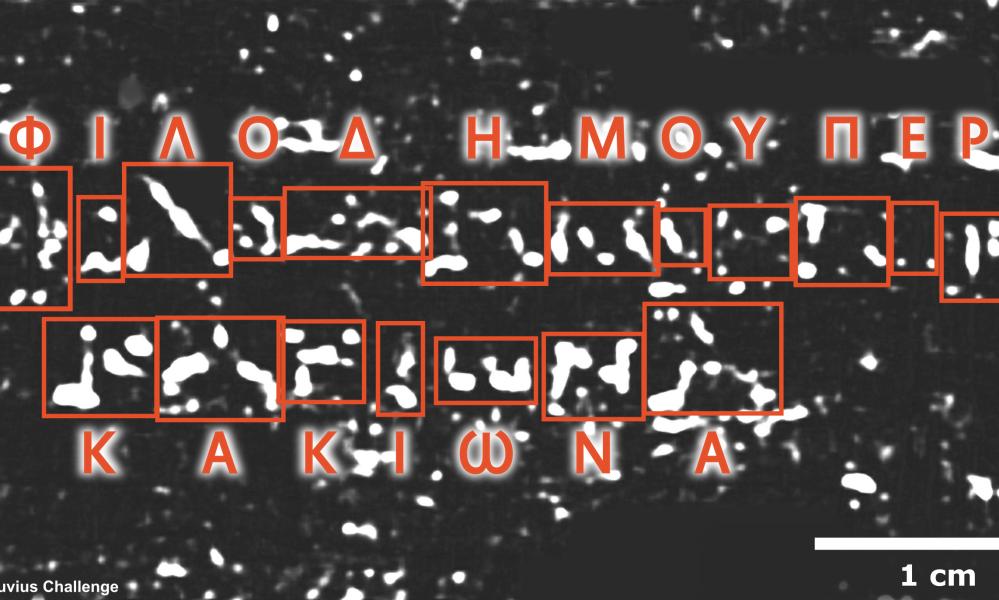A charred scroll recovered from a Roman villa that was buried under ash when Mount Vesuvius erupted nearly 2,000 years ago has been identified as the influential work of an ancient Greek philosopher.
Researchers discovered the title and author on the Herculaneum scroll after X-raying the carbonised papyrus and virtually unwrapping it on a computer, the first time such crucial details have been gleaned from the approach.
Traces of ink lettering visible in the X-ray images revealed the text to be part of a multi-volume work, On Vices, written by the Epicurean philosopher Philodemus in the first century BC. The scroll is one of three from Herculaneum housed at the Bodleian Libraries in Oxford.
“It’s the first scroll where the ink could just be seen on the scan,” said Dr Michael McOsker, a papyrologist at University College London, who is collaborating with researchers in Oxford to read the text. “Nobody knew what it was about. We didn’t even know if it had writing on.”
The scroll is one of hundreds found in the library of a luxury Roman villa thought to have been owned by Julius Caesar’s father-in-law. The villa was buried under ash and pumice when Herculaneum, near Naples, was destroyed along with Pompeii in the eruption of AD79.
Excavations in the 18th century recovered many of the ancient scrolls, most of which are held at the National Library of Naples. But the documents are so badly burnt that they crumble when researchers try to unroll them and the ink is unreadable on the carbonised papyrus.
The latest work builds on earlier breakthroughs from the Vesuvius Challenge, a global competition launched in 2023, which offers prizes for progress in reading the scrolls from 3D X-rays. Last year, a team of computer-savvy students shared the $700,000 (£527,350) grand prize for developing artificial intelligence software that enabled them to read 2,000 ancient Greek letters from another scroll.
The scroll from the Bodleian, named PHerc. 172, was scanned last July at Diamond, the UK’s national synchrotron facility in Oxfordshire. Unusually, some ink was visible in the X-ray images, with researchers spotting the ancient Greek word for “disgust” at least twice in the document.
Further work by Sean Johnson at the Vesuvius Challenge, and separately by Marcel Roth and Micha Nowak at the University of Würzburg, found the title and author of the text in the innermost section of the scroll, earning them the challenge’s $60,000 (£45,200) first title prize.
Alongside “On Vices” and “Philodemus”, a book number on the scroll may be an alpha, suggesting it could be the first instalment of the work. On Vices contains at least 10 books with others covering topics such as arrogance, greed, flattery and household management.
Before long, experts should know far more about the scrolls. Eighteen were scanned at Diamond in March and 20 more will be imaged at the European Synchrotron Radiation Facility in Grenoble this week.
“We’re seeing evidence of ink in many of the new scrolls we’ve scanned but we haven’t converted that into coherent text yet,” said Dr Brent Seales, a computer scientist at the University of Kentucky, who co-founded the Vesuvius Challenge. “That’s our current bottleneck: converting the massive scan data into organised sections that are properly segmented, virtually flattened, and enhanced so that the evidence of ink can then be interpreted as actual text.”
McOsker said: “The pace is ramping up very quickly … All of the technological progress that’s been made on this has been in the last three to five years and on the timescales of classicists, that’s unbelievable. Everything we’re getting from the Herculaneum library is new to us.”
The post X-ray reveals ancient Greek author of charred first century BC Vesuvius scroll appeared first on The Guardian.




